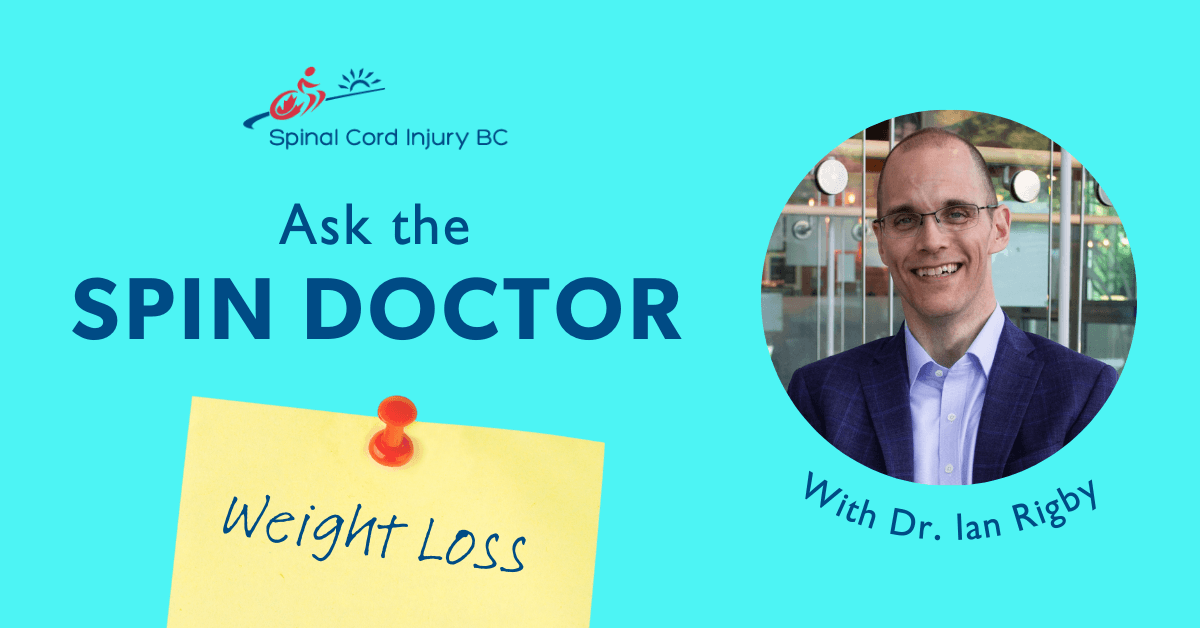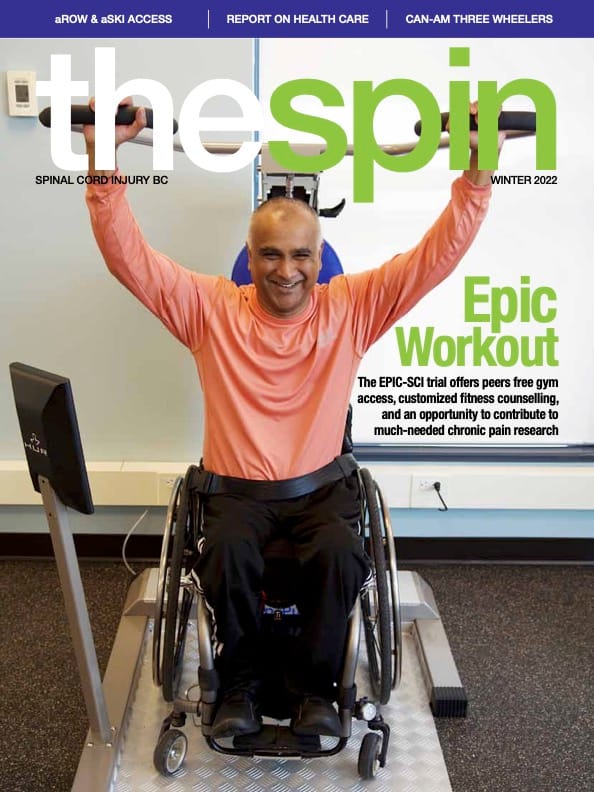
“I feel like I’ve gained weight over the last few years, and I’m struggling with my transfers,” says Gio in Abbotsford. “I think it’s time to think more seriously about my weight. I used to think it was just part of having an SCI. Are there any treatments that could help me get to a healthy weight?”
To answer this issue’s question, we turned to Dr. Ian Rigby, an emergency room physician at Calgary’s Foothills Medical Centre, a consultant with the Alberta Obesity Centre, and a certified American Board of Obesity Medicine diplomate. Dr. Rigby also lives with an SCI, and is the board chair of the Praxis Spinal Cord Institute.
PLEASE NOTE: this column does not discuss the unique needs and concerns of people living with or in recovery from eating disorders. Please take care and consult your own healthcare team for more specific advice.

Gio, you’re not alone. It can be particularly hard to get information on weight management that is informed by the particular risks and needs of people with SCI. I don’t use the term obesity when talking with patients, but it has a medical definition that helps us understand who is most at risk and can help identify treatment options. Medical thinking has changed in the last decade to recognize obesity as a chronic disease of excess body weight that impairs health, with complex contributing factors that are much more than just how or what we eat.
As clinicians, our goal is to support health and prevent and minimize the risks of long term complications. With medical weight management, we think about treatments that help our patients address current health conditions or prevent future complications, especially for those who have complex health conditions affected by excess weight. After SCI, weight gain is common because our bodies are less effective at burning energy and we require less energy for day-to-day living. It can worsen many SCI complications such as edema, sleep apnea, and skin breakdown, and negatively impact the bone and joint health we rely on for mobility. We also see that people with SCI have more mobility and logistical barriers to regular physical activity and food preparation that can make weight management that much harder.
Screening tools are a first step clinicians use to determine who is most at risk of health complications and recommend treatments based on the patient’s health goals and risks. After SCI, our bodies have a different composition of muscle and fat than the general population due to muscle atrophy and lower bone density, so we use waist circumference to screen patients for cardiometabolic risks associated with excess weight. It’s just one part of a more detailed conversation about your health risks and concerns to guide treatment discussions.
As a physician, I know that even very modest changes can lead to very meaningful improvements in management of chronic diseases like high blood pressure and reduction of risks of cardiometabolic conditions. Most physicians will look to take a stepwise approach to considering treatment options based on screening results, health conditions and individual risk factors like family history, with the goal of treating health issues and reducing the chance of serious illness in the future.
The first cornerstone treatment step is lifestyle modifications: nutrition, physical activity, sleep, and behaviour change.
There are a multitude of good nutrition interventions like low-carbohydrate or Mediterranean diets that all have benefits, but the best nutrition approach is one you can stick with long term. Clinicians may make more specific recommendations if you have complications like diabetes, high cholesterol or hypertension. A dietitian can work with you to translate nutrition approaches to a daily menu that works for you.
For physical activity, any is better than none. The Evidence-Based Physical Activity Guidelines for Adults with SCI state that aerobic training should consist of at least 150 minutes per week of moderate physical activity or at least 75 minutes per week of vigorous intensity aerobic exercise. You also need to include strength training at least two times per week and emphasize training large muscle groups to increase lean body mass. Check it out at sciguidelines.ubc.ca.
In our clinic, we spend a great deal of time on the behaviour change part more than any other because it’s so fundamental to enabling any lifestyle change. We use a cognitive behavioural therapy approach involving setting goals, getting support, and problem-solving to overcome obstacles.
The next treatment step considered is prescriptive nutritional interventions such as replacement of one or two meals per day with a calorie-controlled but nutrient-dense shake or bar. Research tells us that these medically-supervised meal replacement approaches are an effective way to manage weight. The combination of dense nutrition and ease of preparation makes this option a popular one.
Medications are the next step, and are usually considered for patients who have more excess weight—especially if this is having negative health effects. The type of medication is chosen based on factors such as coexisting medical conditions. The goals are to decrease appetite, create a “full” feeling earlier, or reduce food cravings.
The last of the treatment options is weight loss surgery. These procedures offer the most benefit for patients who have serious health complications and for whom the benefits outweigh the risks of the surgery. These may be options for people with SCI who meet the criteria, but are better discussed with physicians after other steps are considered.
Remember that meaningful improvement in your current and future health can come with even relatively small changes. Start by talking with your doctor or physiatrist, and discussing the changes you can make to those four lifestyle factors: nutrition, physical activity, behaviour change, and sleep.
This article originally apeeared in the Winter 2022 issue of The Spin. Read more stories from this issue, including:
- Clinical trial enrollment
- Innovative adaptive workout equipment
- A peer’s musical achievement
And more!




